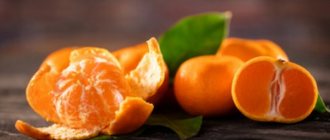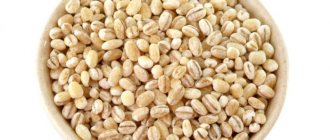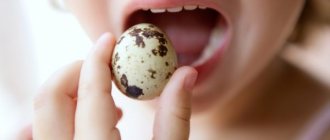Recommended age for candy
The concept of “sweets” includes candies, chocolates, caramels. It is not recommended to give sweets to children under one year of age, since the baby’s immune and digestive systems have not yet established their functioning. Sugar can cause fermentation in the intestines, and hence problems with stool and rashes.
Children prone to diathesis do not need sweet foods until they are 2 years old. Their introduction is possible, but later and with caution.
A child up to one year old can be given sweets in the form of natural sugars. These are fruits and lactose from mother's milk. Water and kefir should not be sweetened.
When is it okay to give sweets to children?
Whether children can have candy is already clear from the above. They are contraindicated for babies under one year old. At an older age, starting from 1-2 years, it is allowed to gradually introduce half a marshmallow into the diet. Children can have sweets in the form of marmalade candies, which contain only natural dyes.
Pastille is also allowed for consumption, provided that it does not contain harmful chemical components. All these products must be introduced gradually and the baby’s well-being monitored. If a rash, itching, or abnormal stool occurs, you should stop taking such products.
Is it possible to give cake to children from the age of one? Doctors agree that such foods, including waffles and muffins, are best introduced into the diet starting from the age of three. At this age, the functioning of the digestive organs is completely balanced, and there are rarely any signs of intolerance.
From 2-3 years old, honey may be present in the child’s menu. This product contains a range of minerals, amino acids and vitamins. All these substances are necessary for the development of the immune system and maintenance of metabolic processes.
Honey can be used as an antibacterial agent at the first sign of infection. It is important to remember that this product is a strong allergen and is contraindicated in case of hypersensitivity.
It is better to find out information about whether children can have chocolate from a pediatrician. Doctors usually allow this product to be given in very small quantities, provided there is no allergy to cocoa. Chocolate must be natural and not contain preservatives.
Harmful products
It is not recommended to use:
- pure sugar. It is better not to add sugar to cereals and purees. It distorts the taste of food, and the child quickly gets used to it;
- Caramel is the worst type of sweet for baby's teeth. Also contains many dyes, sugar;
- pastries and cakes contain a large amount of fats and carbohydrates. This creates a huge load on the small pancreas, but there is no benefit;
- preserves and jams are also high in sucrose.
Dried apricots, dates, raisins are not only foods rich in magnesium and potassium, but also have a pleasant sweetish taste.
They can also act as a dessert for the baby. Excessive sugar consumption up to a year can provoke:
- the occurrence of arterial hypertension in older age;
- the occurrence of obesity, metabolic syndrome, diabetes;
- other endocrine disorders.
Psychologists say that early accustoming a baby to sweets is akin to addiction. A study was conducted, and children who often received chocolate in childhood cannot resist eating sweet foods when they are older.
Desserts for children
Experts recommend giving nutritious sweets and desserts to children only when they are closer to three years of age. And these are not just any confectionery products.
According to Vladislav Zyablitsky, closer to the age of 3, you can start introducing marshmallows, marshmallows, and marmalade. They should not be hard or contain dyes. You need to choose soft white products. No more than 10–15 grams per day. Children under 3–4 years old should not be given cakes, pastries or chocolate.
Before the age of 4, it is not advisable to give children caramel and candies. There is a high risk that the child will choke on them. Oriental sweets (chak-chak, halva, nougat, Turkish delight) can be given no earlier than 4 years. They are very sweet, and the composition is very allergenic.
It is advisable to give sweets after the main meal so as not to interrupt your appetite.
“Excessive sugar consumption leads to overload of the pancreas,” warns the pediatrician, “disruption of food breakdown processes, causing the accumulation of toxins and allergic reactions.”
Article on the topic
“You won’t get up until you finish!” 5 rules for children that are long overdue to be forgotten
The benefits and harms of honey for babies
Honey is a very strong allergen. It is better for children with severe allergies to refrain from using it.
Honey is a storehouse of vitamins and microelements important for the growth and development of a child. Has antiseptic and antibacterial properties. Honey can also increase the immune-resistant properties of a child’s body.
Previously, grandmothers advised mothers to give a spoonful of honey on the tip to calm the baby. It contains sugars that have an energetic effect on cells, improve interneuron connections, and are a source of positive emotions.
Sources
- Androutsos O., Perperidi M., Georgiou C., Chouliaras G. Lifestyle Changes and Determinants of Children's and Adolescents' Body Weight Increase during the First COVID-19 Lockdown in Greece: The COV-EAT Study. // Nutrients - 2021 - Vol13 - N3 - p.; PMID:33805678
- Verdonschot A., de Vet E., van Seeters N., Warmer J., Collins C.E., Bucher T., Haveman-Nies A. Caregivers' Role in the Effectiveness of Two Dutch School-Based Nutrition Education Programs for Children Aged 7 -12 Years Old. // Nutrients - 2021 - Vol13 - N1 - p.; PMID:33401470
- Zaborskis A., Grincaitė M., Kavaliauskienė A., Tesler R. Family structure and affect in adolescent eating behavior: a cross-national study in forty-one countries. // Public Health Nutr - 2021 - Vol - NNULL - p.1-12; PMID:33106205
- Sadeh-Sharvit S., Runfola CD., Welch HA., Gibbs EL., Dickens CE., Lock J., Safer DL. Parent-based prevention after parental weight loss surgery: a pilot case-series trial. // Surg Obes Relat Dis - 2021 - Vol16 - N9 - p.1321-1327; PMID:32636177
- Woolf HR., Fair M., King SB., Dunn CG., Kaczynski AT. Exploring Dietary Behavior Differences among Children by Race/Ethnicity and Socioeconomic Status. // J Sch Health - 2021 - Vol90 - N8 - p.658-664; PMID:32557667
- Yang J., Tani Y., Tobias DK., Ochi M., Fujiwara T. Eating Vegetables First at Start of Meal and Food Intake among Preschool Children in Japan. // Nutrients - 2021 - Vol12 - N6 - p.; PMID:32545520
- Wasilewska E., Małgorzewicz S., Gruchała-Niedoszytko M., Skotnicka M., Jassem E. Dietary Habits in Children with Respiratory Allergies: A Single-Center Polish Pilot Study. // Nutrients - 2020 - Vol12 - N5 - p.; PMID:32456203
- Broniarek-Machnik M., Bołtacz-Rzepkowska E. Effect of health promoting behaviors on caries prevalence in children aged 1-3 years from the Skierniewice region. // Przegl Epidemiol - 2021 - Vol74 - N4 - p.716-727; PMID:33861044
- Garcia AL., Athifa N., Hammond E., Parrett A., Gebbie-Diben A. Community-based cooking program 'Eat Better Feel Better' can improve child and family eating behaviors in low socioeconomic groups. // J Epidemiol Community Health - 2021 - Vol74 - N2 - p.190-196; PMID:31727789
- Hess JM., Cifelli CJ., Agarwal S., Fulgoni VL. Comparing the cost of essential nutrients from different food sources in the American diet using NHANES 2011-2014. // Nutr J - 2021 - Vol18 - N1 - p.68; PMID:31706353
When and how to start giving the first sweets?
As we have already found out, children under one year old do not need sweets in any form. You can start after a year with marshmallows or marshmallows, marmalade without sugar powder. It is better to give after the main course, preferably at lunch. If allergic reactions occur, the product is excluded.
After 3 years, your child can start giving sweets in the form of cakes or pastries. At this point, the digestive system is almost completely organized and can process these foods.
To avoid food poisoning, pay attention to the expiration dates of sweet products with protein creams.
Parents themselves shape the eating habits of their children. Excessive consumption of sweet foods may pose a risk of developing metabolic disorders, which will subsequently lead to obesity, diabetes and other endocrine diseases.
Try not to reward your child with candy. It’s better to praise him or hug him once again. Do not develop a food addiction to sweets in your baby.
What sweets are good for young children?
From the age of 6 months, babies are introduced to sugar - in juices and berry purees (these are natural sugars). A little later - in porridges, compotes, tea. Whether this is bad or normal is another question. It is a fact.
We tell and show everything about how to care for a child, about his health and development in the video course “The baby is born. What's next?"
Whether allergy sufferers and diabetics can have sweets and to what extent is also a separate question for another article. What can be sweet and healthy for small children to eat - that is the question of this material.
From the age of one, there is more sugar in the baby’s life. Decoctions and compotes (for example, from dried fruits), berry mousses, natural marshmallows, marshmallows and even sucking candies come into the diet. From about two years old, children try jams and preserves, honey - for example, in porridge or pie, ice cream.
From 1 to 3 years, the daily dose of sugars is about 40 grams. What is definitely contraindicated at this age is soda and chocolate.
Sweet rules from children's nutritionists:
- Sweets - after the main meal. It is advisable to rinse your mouth after eating something sweet.
- Sweets are not forbidden fruit. You just need to limit yourself a little.
- You can try something delicious while visiting.
What sweets can children eat (in moderation) and at what age?
Marshmallows and marshmallows
on agar-agar or gelatin consist of fruit puree, sugar and egg whites. These sweets are well digested and accepted by the stomach because they do not contain dyes, vegetable or animal fats.
Apple pectin removes toxins, improves metabolism, and agar-agar is rich in minerals, iodine, gelatin is good for hair, blood vessels, and skin. So these are as healthy sweets as possible. They can be tried by children from 2 years old.
Read in our blog: “Healthy fast food recipes for children”
Marmalade
also relatively useful. It consists of fruit juice, syrup and sugar, and natural thickeners (pectin or agar-agar). A harder type of marmalade is jelly. It can be additionally saturated with vitamin C - also a good sweet, but you need to be careful so that the baby can chew this “jelly”. Regular marmalade is acceptable from 2 years of age.
Chocolate
We will leave it for preschool and school ages. Then this sweetness will even become useful. It improves immunity, metabolism and helps fight stress. But not for kids, for them it is a strong allergen.
Meringue
(homemade is best) consists of protein and sugar. These products are simply hard-boiled and baked in the oven. This sweet is tasty and healthy from 1.5 to 2 years of age in small quantities.
Dried fruits
contain many microelements and vitamins, this is well known. They help the functioning of the heart and intestines. Plus, they're delicious. Raisins, prunes, dried apricots, and figs can be eaten by children from 2 years old.
! Candied fruits are not healthy: they contain a lot of sugar, almost no benefit. In addition, they are made from exotic materials, which can cause a reaction in a child.
No to cakes, no to pastries, no honey to try.
Waffles, gingerbread, cookies – a little bit.
They contain a lot of calories and very few nutrients - vitamins, proteins and minerals.
People need sugar, but little ones simply need it for happiness. It adds vigor, strength, and improves immunity. But only if used wisely.
Excess sugar reduces appetite, and the child does not receive the necessary substances. Sweets disrupt metabolism and the functioning of the gastrointestinal system. Diabetes and obesity are global problems that can be caused by uncontrolled consumption of sweet foods.
Parents themselves should not eat “bad” foods in order to set a good example of reasonable consumption and healthy eating.
Teeth and sweets
Artemova I. O., doctor, pediatric dentist: “Of course, childhood without sweets is not childhood.
Try to brush your baby teeth or rinse your mouth after eating sweets. This way you can avoid caries in baby teeth.” Sweets for children according to Komarovsky : “This is not the best food for children. It is especially harmful to teeth and appetite. Of course, you won’t do much harm to your health if you give sweets for dessert after dinner, but it’s best to avoid such treats between feedings. Do not keep sweets at home, do not show your child that they are in the house. Try not to go shopping with your child or buy sweets in front of him. If a child has a tendency to be overweight, then it is better to give up sweets altogether.”
It is very easy to teach a child to eat sweets, as it brings him pleasure. Try to give sweets for dessert at least 1-2 times a week, respecting the age limits. If you are prone to allergic reactions, sweets should be completely excluded from the diet.
Why should you avoid sweets?
Experts recommend avoiding sweets for as long as possible, delaying the introduction of desserts to your child. Yes, from 5 months you start complementary feeding with fruit and vegetable purees, they are slightly sweet, and that’s enough. “Encouraging children to try new foods is a tedious and thankless task, but this does not apply to sugar,” notes nutritionist Tatyana Eliseeva , “kids eat sweets more than adults and this does not require persuasion. However, such nutrition creates dangerous eating habits.
Most experts advise not to introduce sweets into the diet until the age of three. Desserts are linked to excess weight, tooth decay, diabetes, fatty liver disease, high blood pressure, heart problems, other diseases and reduced intelligence. In addition, our brain is programmed to love sweets, which stimulates the release of dopamine (the hormone of joy, pleasure). The reward center of the brain gets used to dopamine and over time requires more and more of the pleasure source to achieve the same pleasant feeling.
“Uncontrolled eating of sweets can lead to problems with metabolism,” supports colleague Vladislav Zyablitsky. — Excessive consumption of sweets leads to increased gas formation, constipation, and bloating. In addition, by consuming sweets, the child receives a source of energy that must be spent. Children begin to behave actively and may become overexcited, which leads to problems with sleep.”
Article on the topic
Eat to learn. 5 tips for parents on feeding their children
Sweets for children that are beneficial
We all know that children have a big sweet tooth. Parents, and especially grandmothers, trying to please their little child, constantly treat and treat him with lollipops, sweets and chocolates, cakes and ice cream. Are there any healthy sweets for children, which sweets are the most harmless, what will benefit and delight children?
Let's figure out what you can offer your baby instead of harmful treats from our food industry. What confectionery products are not harmful to children's bodies if consumed in moderation?
Of course, there are desserts and foods that you can offer your children. Yes, it turns out that sweets can be healthy too - honey, raspberry jam, natural ice cream, halva. Proper nutrition is important for children of all ages.
Confectionery products, of course, contain sugar, but in addition to it there is a high content of vitamins and substances necessary for the body. Well, if you learn how to prepare delicious desserts and candies yourself from high-quality natural ingredients, you will always know what to give your baby and avoid many health problems.
Benefits of implantation
Implantation is the procedure of installing a titanium pin, which simulates a root, into the jaw bone. A crown is then placed on this pin. The implant completely replaces the natural tooth, which is the main advantage of this dental procedure.
The main advantages of implantation:
- If the implant is made and installed with high quality, its service life is at least 15 years (but most often it remains with the patient forever).
- Unlike other types of prosthetics, implantation does not damage adjacent teeth.
- Aesthetic attractiveness of the dentition, a beautiful smile.
- Possibility to install any number of implants.
- Titanium pins take root in 90%; after adaptation there is no discomfort.
- When chewing food, the load is distributed evenly.
- A wide selection of designs and implantation methods provides an individual approach.
The success of the implantation procedure directly depends on the professionalism of the doctor. Choosing a good clinic with experienced dentists, quality materials and following all hygiene rules will give you a beautiful smile and comfort.











